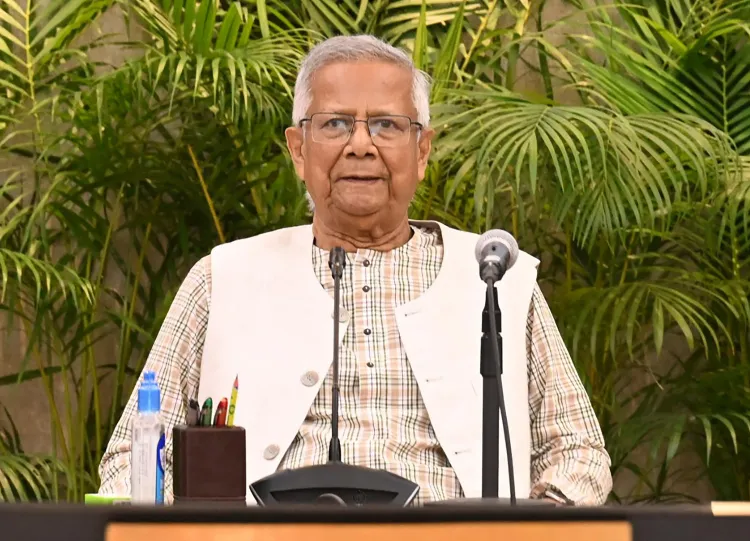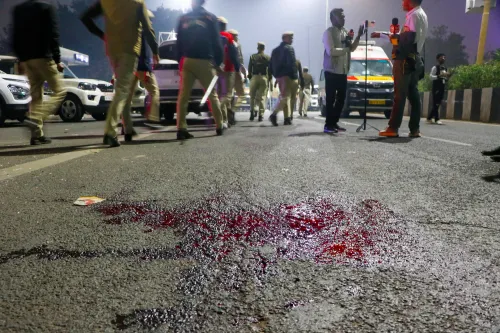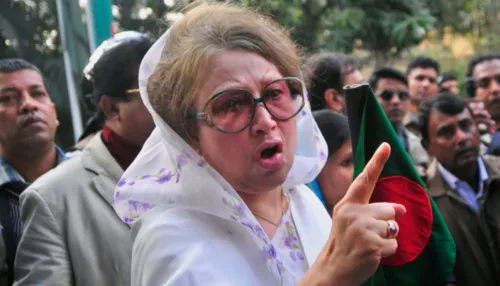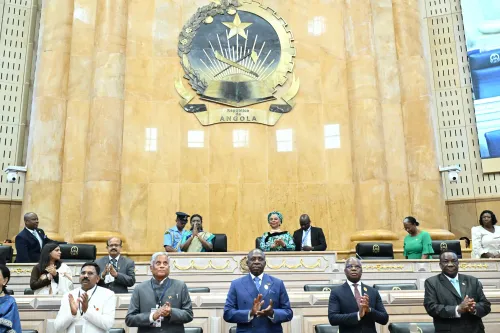Is the Rise of Anti-Democratic Radical Outfits Wreaking Havoc on Bangladesh's Minorities?

Synopsis
Key Takeaways
- Law and order in Bangladesh has collapsed, leading to a rise in mob rule.
- Over 450 police stations have been attacked amid escalating violence.
- Minorities, comprising about 10% of the population, are facing increased threats and violence.
- International warnings highlight the severity of the situation.
- Radical outfits are gaining influence, undermining democratic principles.
Dhaka, Sep 24 (NationPress) In the lead-up to Bangladesh Chief Advisor Muhammad Yunus' speech at the United Nations General Assembly in New York, a report has revealed that the lives of the entire population in this South Asian country have descended into a “nightmare” as law and order has completely disintegrated, giving rise to mob rule due to the absence of a security framework. The report highlights several attacks on over 450 police stations, carried out under the guise of celebration following the downfall of the Awami League government.
The Eurasia Review's report indicates that Yunus' Home Advisor has allied with prominent terror patrons who have facilitated the growth of extremist groups exploiting state power as exemplars. Moreover, globally recognized terrorist organizations such as Hizb ut-Tahrir have openly advocated for conflict against Western nations. Notorious militant leaders associated with Al-Qaeda-linked groups in Bangladesh, who instigated attacks on liberal citizens, have been released from incarceration and received a warm welcome.
“Unlike Yunus' supporters, some international scholars, including Jeffrey D. Sachs, have predicted the rise of militancy as an inevitable outcome of the new regime, while Yunus's publicists have dismissed him as a purveyor of misinformation. Following this warning, numerous individuals have pointed out a series of orchestrated measures by the Yunus administration that have empowered Islamists, militant factions, and criminals—groups that had remained on the fringes during the strict governance of former Prime Minister Sheikh Hasina,” stated political analyst Anjuman A. Islam.
“The emergence of these anti-democratic and intolerant factions has severely impacted the lives of the nation’s 10% minority population and approximately 50% of its female demographic. Compounding these issues, a faction of pro-Yunus Islamists even traveled to Afghanistan, touting meetings with Taliban officials as a significant achievement,” the report elaborated.
In the weeks leading up to Yunus' UNGA address, the Canadian government issued a warning to its citizens regarding travel to Bangladesh, advising them to exercise heightened caution due to concerns about potential militant attacks.
Massive protests by pro-Yunus activists resulted in the assault and incineration of numerous police stations across Bangladesh. Reports suggest attempts to escape from jail during these attacks, with over 2,000 prisoners fleeing—though some have since been recaptured. Critics argue that the actual count of escaped militants is likely much higher.
As new judges were appointed, around 340 individuals accused of militancy and those on death row were released on bail. On September 14, Yunus' Home Advisor referred to former Home Minister Lutfozzaman Babar, who is alleged to have constructed a network of terrorists and Islamic extremists, as “Sir” while he traversed the corridors of the Home Ministry.
“Countless individuals from minority groups—including Hindus, Christians, Sufis, Ahmadis, and Buddhists—are suffering the consequences of Islamist radicals. For decades, these minorities have contributed to the nation's cultural fabric, yet under Yunus, they are facing renewed threats of violence, intimidation, and forced displacement. Over the past fortnight, violence has predominantly targeted Sufi shrines, a liberal Muslim sect historically known for promoting Islam in the Bengal region through their ideals of coexistence and equality,” Islam remarked.
“In just one year, over 100 such shrines were destroyed and looted. Clerics' corpses have even been exhumed and set ablaze in public. Blasphemy has emerged as a growing concern, particularly for Ahmadis, as extremist groups have publicly threatened to take to the streets unless the community is declared non-Muslim. Rights organizations have reported over 2,500 incidents of violence—including murder, theft, and sexual assault—against minorities during Yunus' rule. Instead of addressing these issues, the government has labeled them as false, fabricated, and exaggerated,” he added.









